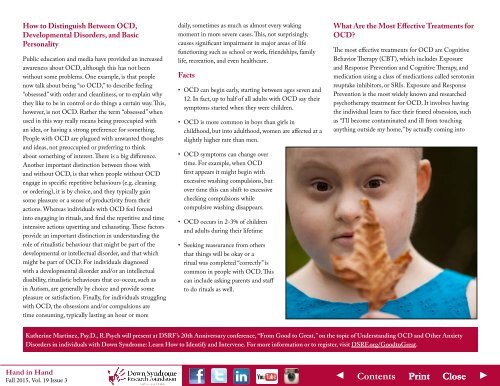Hand in Hand
HIH19-3
HIH19-3
- No tags were found...
Create successful ePaper yourself
Turn your PDF publications into a flip-book with our unique Google optimized e-Paper software.
How to Dist<strong>in</strong>guish Between OCD,<br />
Developmental Disorders, and Basic<br />
Personality<br />
Public education and media have provided an <strong>in</strong>creased<br />
awareness about OCD, although this has not been<br />
without some problems. One example, is that people<br />
now talk about be<strong>in</strong>g “so OCD,” to describe feel<strong>in</strong>g<br />
“obsessed” with order and cleanl<strong>in</strong>ess, or to expla<strong>in</strong> why<br />
they like to be <strong>in</strong> control or do th<strong>in</strong>gs a certa<strong>in</strong> way. This,<br />
however, is not OCD. Rather the term “obsessed” when<br />
used <strong>in</strong> this way really means be<strong>in</strong>g preoccupied with<br />
an idea, or hav<strong>in</strong>g a strong preference for someth<strong>in</strong>g.<br />
People with OCD are plagued with unwanted thoughts<br />
and ideas, not preoccupied or preferr<strong>in</strong>g to th<strong>in</strong>k<br />
about someth<strong>in</strong>g of <strong>in</strong>terest. There is a big difference.<br />
Another important dist<strong>in</strong>ction between those with<br />
and without OCD, is that when people without OCD<br />
engage <strong>in</strong> specific repetitive behaviours (e.g. clean<strong>in</strong>g<br />
or order<strong>in</strong>g), it is by choice, and they typically ga<strong>in</strong><br />
some pleasure or a sense of productivity from their<br />
actions. Whereas <strong>in</strong>dividuals with OCD feel forced<br />
<strong>in</strong>to engag<strong>in</strong>g <strong>in</strong> rituals, and f<strong>in</strong>d the repetitive and time<br />
<strong>in</strong>tensive actions upsett<strong>in</strong>g and exhaust<strong>in</strong>g. These factors<br />
provide an important dist<strong>in</strong>ction <strong>in</strong> understand<strong>in</strong>g the<br />
role of ritualistic behaviour that might be part of the<br />
developmental or <strong>in</strong>tellectual disorder, and that which<br />
might be part of OCD. For <strong>in</strong>dividuals diagnosed<br />
with a developmental disorder and/or an <strong>in</strong>tellectual<br />
disability, ritualistic behaviours that co-occur, such as<br />
<strong>in</strong> Autism, are generally by choice and provide some<br />
pleasure or satisfaction. F<strong>in</strong>ally, for <strong>in</strong>dividuals struggl<strong>in</strong>g<br />
with OCD, the obsessions and/or compulsions are<br />
time consum<strong>in</strong>g, typically last<strong>in</strong>g an hour or more<br />
daily, sometimes as much as almost every wak<strong>in</strong>g<br />
moment <strong>in</strong> more severe cases. This, not surpris<strong>in</strong>gly,<br />
causes significant impairment <strong>in</strong> major areas of life<br />
function<strong>in</strong>g such as school or work, friendships, family<br />
life, recreation, and even healthcare.<br />
Facts<br />
• OCD can beg<strong>in</strong> early, start<strong>in</strong>g between ages seven and<br />
12. In fact, up to half of all adults with OCD say their<br />
symptoms started when they were children.<br />
• OCD is more common <strong>in</strong> boys than girls <strong>in</strong><br />
childhood, but <strong>in</strong>to adulthood, women are affected at a<br />
slightly higher rate than men.<br />
• OCD symptoms can change over<br />
time. For example, when OCD<br />
first appears it might beg<strong>in</strong> with<br />
excessive wash<strong>in</strong>g compulsions, but<br />
over time this can shift to excessive<br />
check<strong>in</strong>g compulsions while<br />
compulsive wash<strong>in</strong>g disappears.<br />
• OCD occurs <strong>in</strong> 2-3% of children<br />
and adults dur<strong>in</strong>g their lifetime<br />
• Seek<strong>in</strong>g reassurance from others<br />
that th<strong>in</strong>gs will be okay or a<br />
ritual was completed “correctly” is<br />
common <strong>in</strong> people with OCD. This<br />
can <strong>in</strong>clude ask<strong>in</strong>g parents and staff<br />
to do rituals as well.<br />
What Are the Most Effective Treatments for<br />
OCD?<br />
The most effective treatments for OCD are Cognitive<br />
Behavior Therapy (CBT), which <strong>in</strong>cludes Exposure<br />
and Response Prevention and Cognitive Therapy, and<br />
medication us<strong>in</strong>g a class of medications called seroton<strong>in</strong><br />
reuptake <strong>in</strong>hibitors, or SRIs. Exposure and Response<br />
Prevention is the most widely known and researched<br />
psychotherapy treatment for OCD. It <strong>in</strong>volves hav<strong>in</strong>g<br />
the <strong>in</strong>dividual learn to face their feared obsession, such<br />
as “I’ll become contam<strong>in</strong>ated and ill from touch<strong>in</strong>g<br />
anyth<strong>in</strong>g outside my home,” by actually com<strong>in</strong>g <strong>in</strong>to<br />
Kather<strong>in</strong>e Mart<strong>in</strong>ez, Psy.D., R.Psych will present at DSRF’s 20th Anniversary conference, “From Good to Great,” on the topic of Understand<strong>in</strong>g OCD and Other Anxiety<br />
Disorders <strong>in</strong> <strong>in</strong>dividuals with Down Syndrome: Learn How to Identify and Intervene. For more <strong>in</strong>formation or to register, visit DSRF.org/GoodtoGreat.<br />
<strong>Hand</strong> <strong>in</strong> <strong>Hand</strong><br />
Fall 2015, Vol. 19 Issue 3


